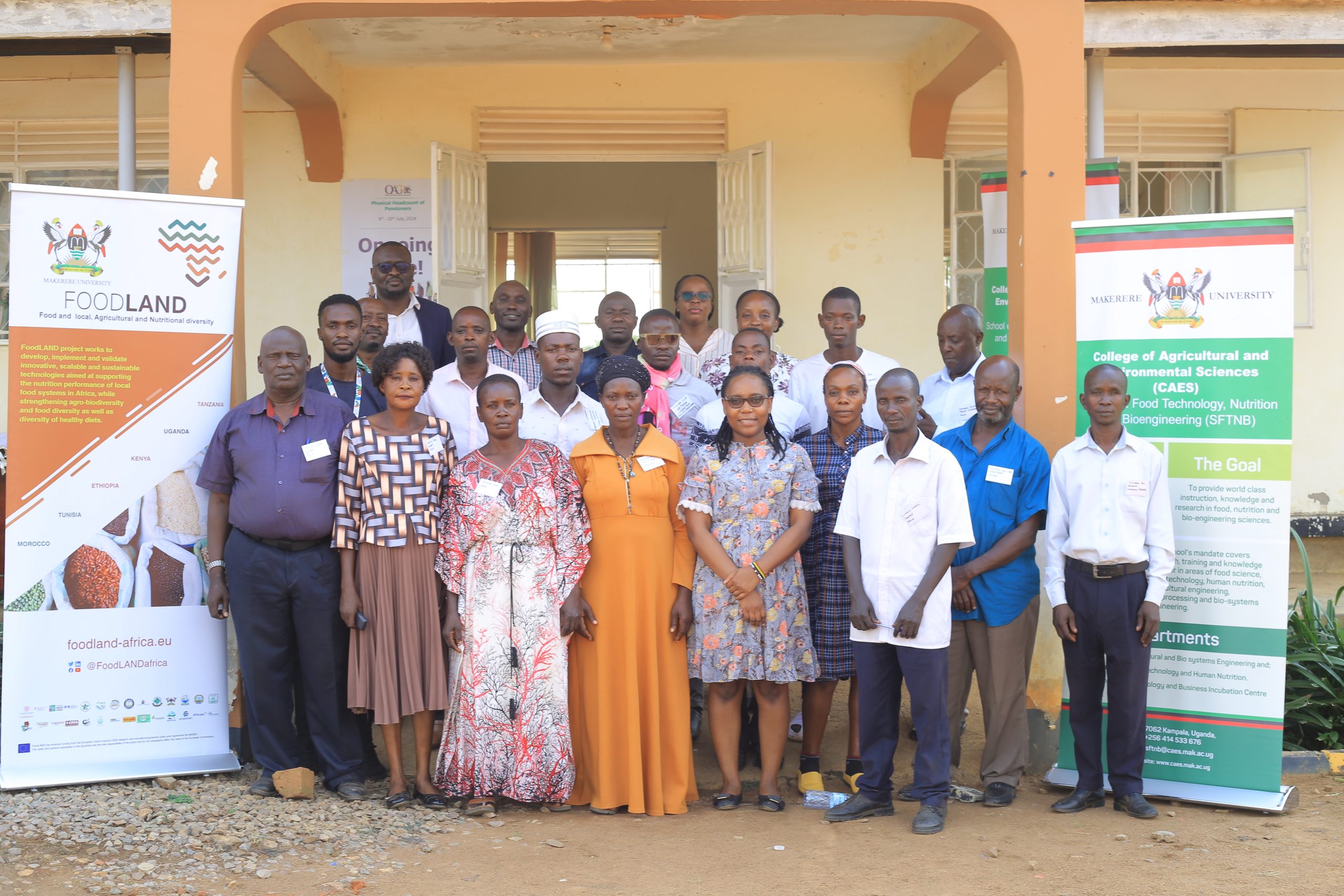
******Food and Local, Agricultural, and Nutritional Diversity (FoodLAND) project aims to develop, implement and validate innovative, scalable, and sustainable technologies aimed at supporting the nutrition performance of local food systems in Africa, while strengthening agro-biodiversity and food diversity as well as diversity of healthy diets.
……………………………………………………………………………………………….
Experiences of Nakaseke District farmers
Farmers in Nakaseke District are indebted for the support and training received from the FoodLAND Project. Although many had been engaged in the activity, they lacked knowledge and skills of modern farming. Connected to FoodLAND through VEDCO, a non-governmental and not for profit agricultural organization, the farmers have acquired skills on value addition, precision irrigation/fertigation, smart storage systems, gardening and hydroponics systems, biodegradable mulching, precision crop protection systems, precision harvesting systems and agro-ecological intensification practices.
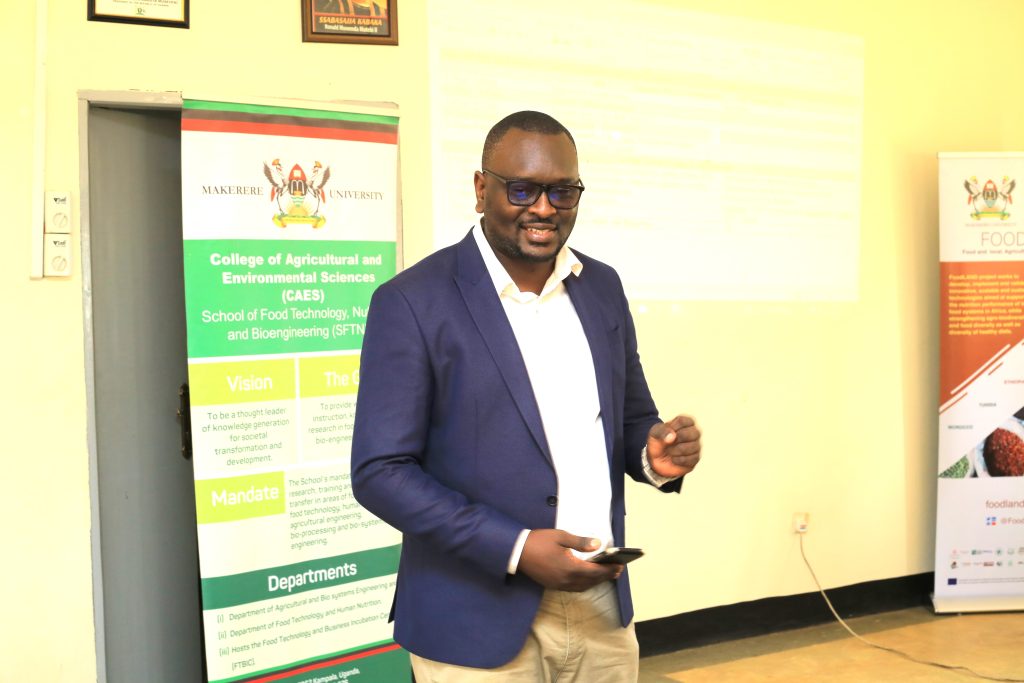
According to Ms. Nakawuba Sarah, a widow and tomato farmer in Kapeeka Sub County, Nakaseke District, the knowledge acquired has enabled her to expand, and gain more profits. “I extend my gratitude to FoodLAND and the funders of the project. The knowledge acquired over time has enabled me to expand my farm and earn more money. Due to ignorance, we used to be exploited – people would buy our products cheaply because we lacked knowledge of preservation. The training on value addition has helped us learn how to preserve our products and we are now benefiting more from them. At the time my husband died, we had just a small house built on his father’s land. I am happy that with the support received from VEDCO and FoodLAND, I have bought a plot of land, built a house, and I am able to pay school fees for my children. I once again thank VEDCO and the FoodLAND. Although the FoodLAND project is ending soon, I request that they do not leave us. They should continue training us so that we further improve our skills.”
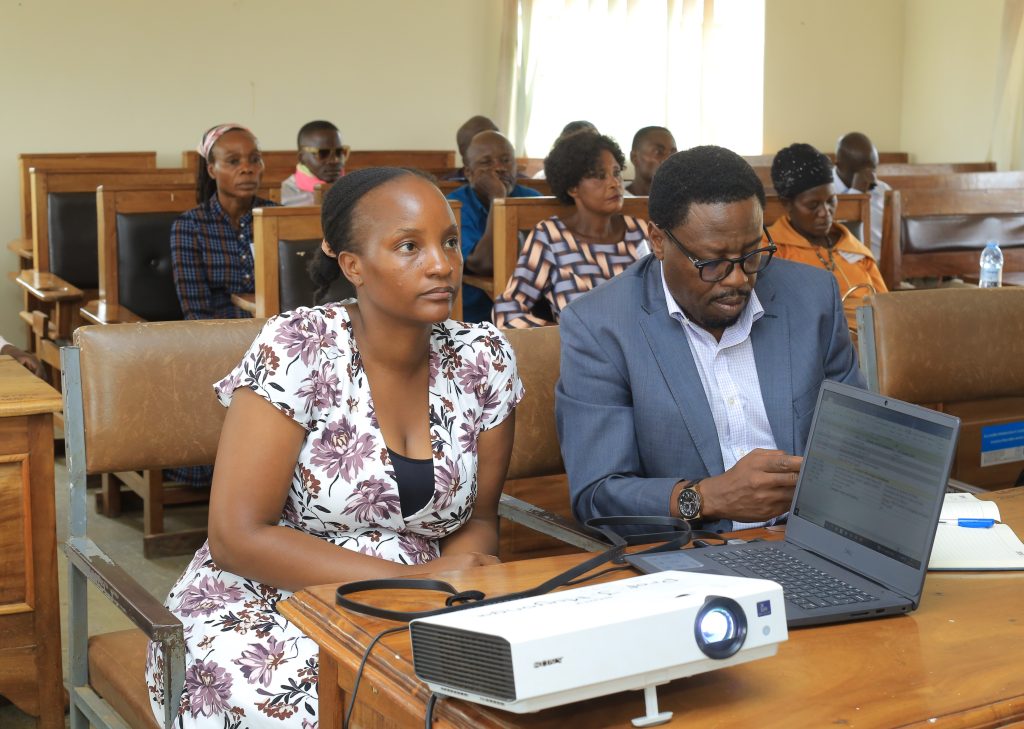
Mr. Lubowa Samuel Sunday, also a farmer in Kapeeka Sub County, Nakaseke District is equally grateful. Through FoodLAND, several farmers in Nakaseke District have acquired knowledge of climate smart agriculture. “Farming in the dry season is no longer a challenge. Our harvest has increased and we are now earning more. However we still face a number of challenges including the high cost of fertilizers and pesticides. We appeal to the project team to conduct more research on natural remedies for the challenges we are experiencing.”
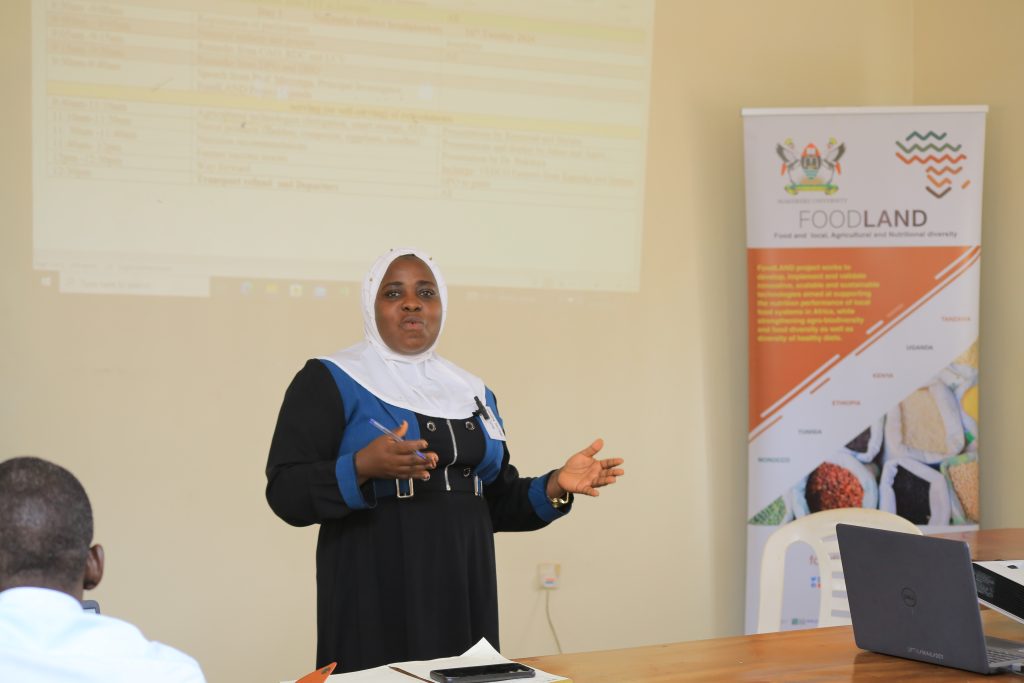
Ms. Nankya Jane, a coffee and banana farmer Semuto Sub County, Nakaseke District, the irrigation skills acquired through the project have greatly improved her farm. “The place where I do my farming was so dry, and this, in many cases, affected my yields. Through VEDCO, we were taken to the Makerere University Agricultural Research Institute Kabanyolo (MUARIK) where we acquired skills on proper irrigation and value addition using technologies developed by the FoodLAND Project. If I had acquired these skills when I started 7 years ago, I would be very far. My appeal is that you continue offering training to us. There is a lot more that we need to learn.”
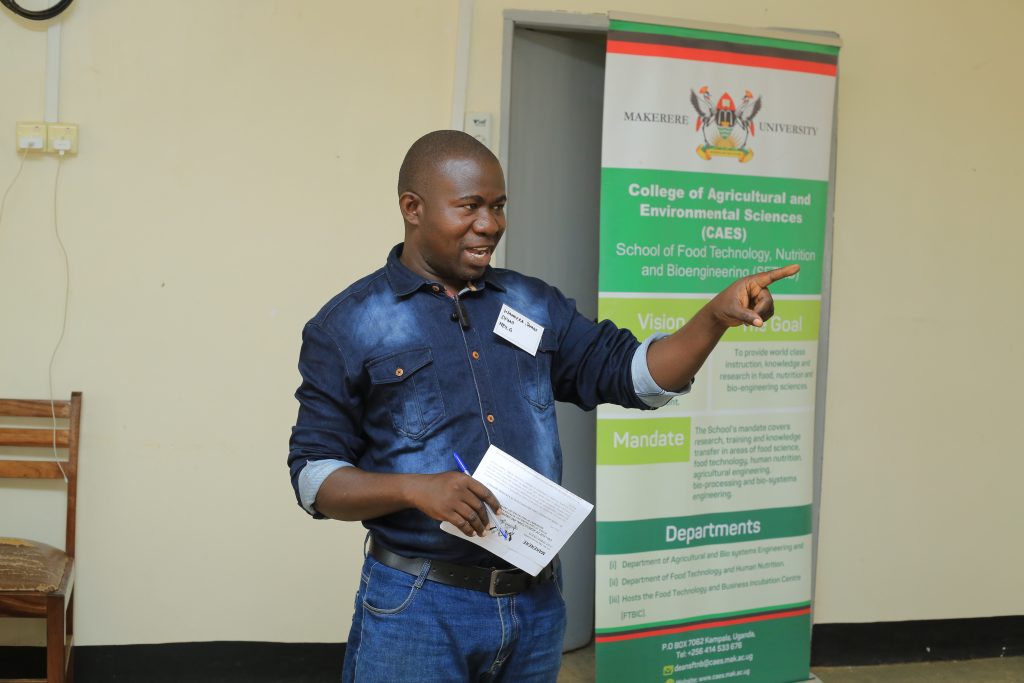
About the FoodLAND project
Launched in 2020, the main objective of the FoodLAND project was to develop, implement and validate innovative, scalable and sustainable technologies aimed at supporting the nutrition performance of local food systems in Africa, while strengthening agro-biodiversity and food diversity as well as diversity of healthy diets.
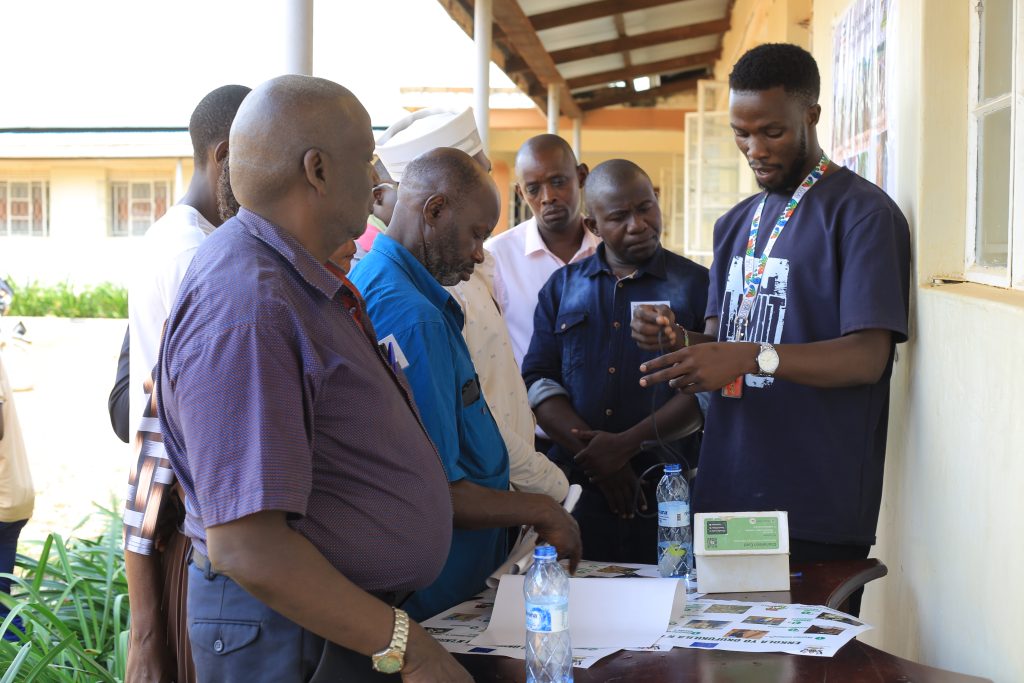
Funded to the tune of 7 million euro by the European Commission within the Horizon 2020 programme, and led by Alma Mater Studiorum – University of Bologna (Italy), the project committed to developing a range of innovations for local agriculture and aquaculture development, as well as to nudging consumers towards healthier eating behaviour in six African countries: Morocco, Tunisia, Ethiopia, Kenya, Uganda and Tanzania. The project specifically aimed to empower smallholder farmers and food operators, foster nutrition responsive and sustainable agro-biodiversity, reinforce the productivity and resilience of food supply chains, and create new market opportunities at both the local and global scales, thereby encouraging the flourishing of rural communities. The project was envisaged to create a network of 14 local Food Hubs—paired with 14 separate cities in these countries—that would mobilise relevant actors in rural, urban and peri-urban communities and serve as injection points for testing and introducing the innovations. The 28 partners that comprise the FoodLAND consortium (18 of them African institutions while the other 10 are European) were expected to work together to develop, implement and validate 12 technological innovations; which include organizational and technological innovations for both vegetable and fish farming and food processing systems, together with 17 novel local food products, ranging from fresh, dried and processed vegetables and fish to composite flours and therapeutic foods.
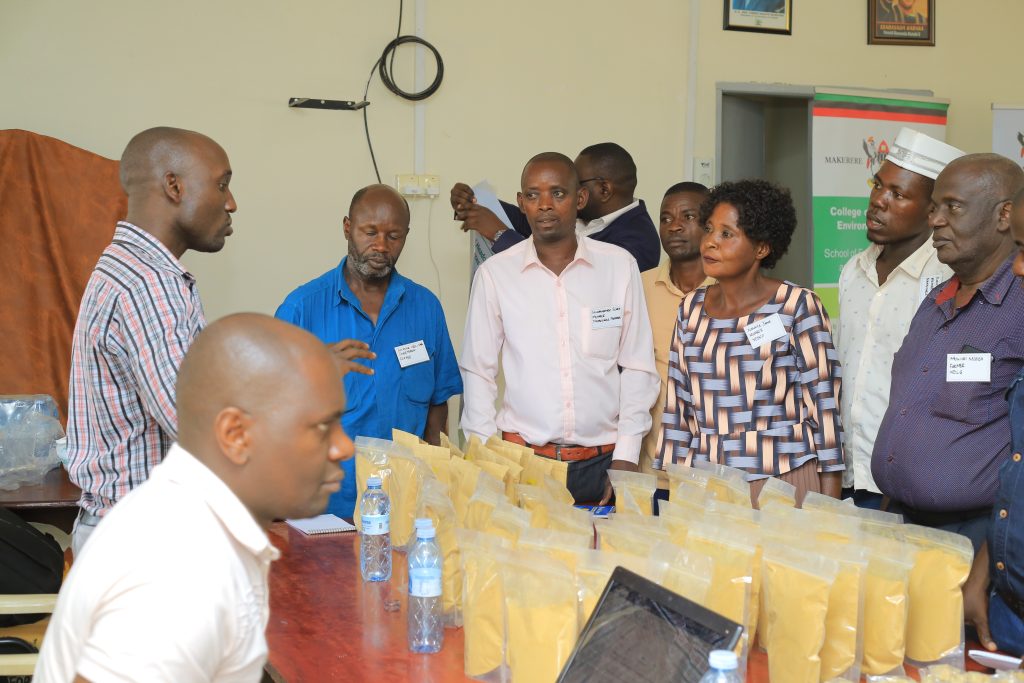
In Uganda, the project was implemented in 6 districts namely; Masaka, Nakaseke, Kamuli, Lwengo, Mukono and Wakiso, and was led by Prof. John Muyonga from the Department of Food Technology and Nutrition, College of Agriculture and Environmental Sciences (CAES), Makerere University. Other members on the project were: Prof. Johnny Mugisha from CAES; Dr. Cassius Aruho, Dr. Puline Nakyewa, Dr. Margaret Masette, Dr. Getrude Atukunda and Dr. Justus Rutaisire from NARO; Mr. Henry Nsereko from VEDCO; and Prof. Dorothy Nakimbugwe from Nutreal.
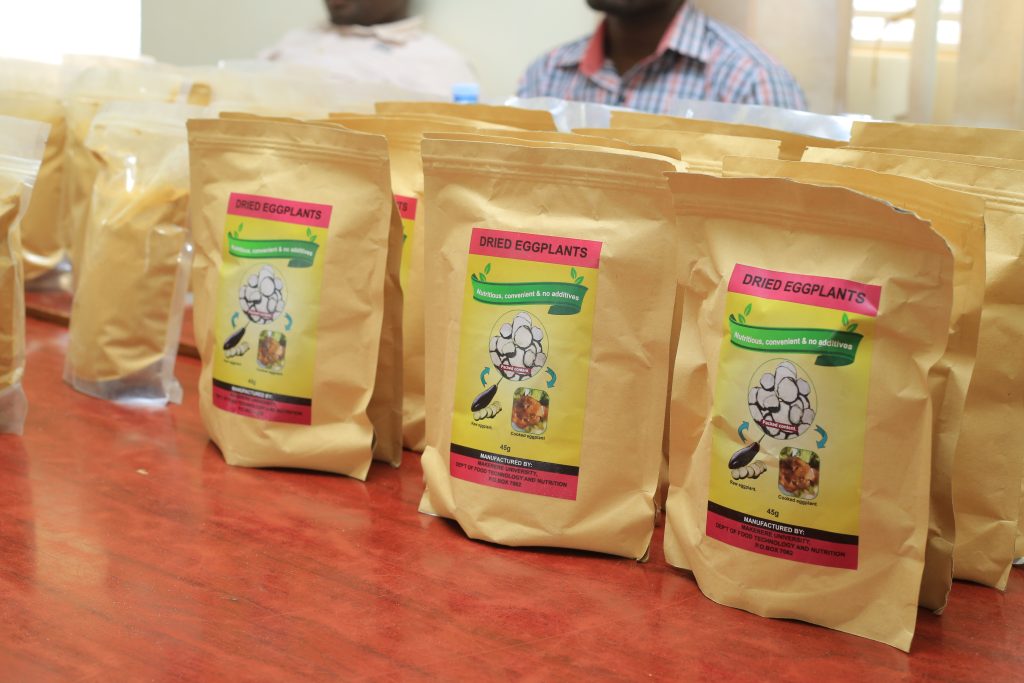
To date, the project team in Uganda has registered a number of achievements including;
- New nutrient enhanced food products – Noodles containing orange fleshed sweetpotatoes and biofortified beans; instant flours containing orange fleshed sweetpotatoes, biofortified beans and grain amaranth; and dry eggplant. Arrangements are in place for commercialization of the technologies by SMEs.
- Establishment of infrastructure at MUARIK for research and training on fertigation (irrigation that supplies water together with manure) and precision irrigation.
- Development of technology for smart cold storage of perishable foods such as fruits and vegetables. The technology allows for remote monitoring of temperature and relative humidity.
- Development of technology for rodent control in stores. This technology has been shown to be effective in preventing of rodent damage to food in stores.
- Promotion of agro-ecological intensification – Applying ecological principles to ensure sustainable agricultural production.
- Testing application of bio-based packaging of food
- Training of 100 farmers in different production technologies.
- Training of 3 M.Sc.
- Developing of nutrition guidelines for adults and the elderly.
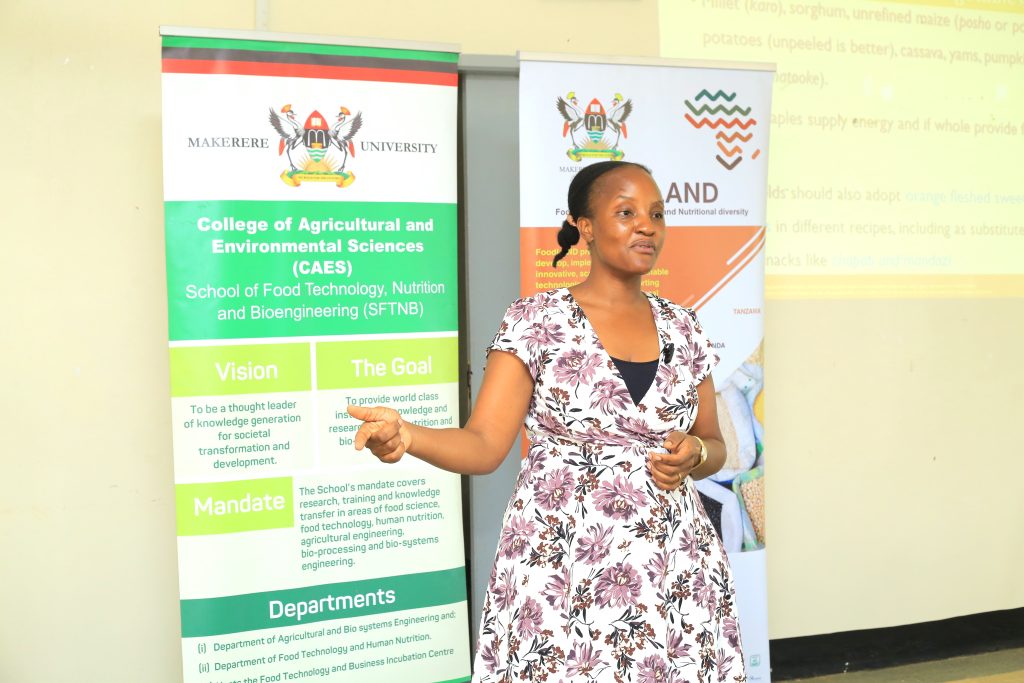
Dissemination of the project findings and achievements to farmers and district leaders in Nakaseke
On 16th July 2024, the project team held a dissemination workshop for Nakaseke District leaders and farmers to sensitize them on different aspects including the research findings and recommendations for improved farming practices. Coordinated by Ms. Josephine Kisakye, and conducted at Butalangu District Headquarters, the workshop was attended by representatives of farmer groups in Nakaseke as well as the district officials, including the CAO, DHO, DPMO and RDC. On behalf of the Project Coordinator, Dr Richard Bukenya, also a member of staff in the Department of Food Technology and Nutrition briefed the farmers on the findings of the project, highlighting the project objectives and progress made thus far, including the technologies, novel raw materials, ingredients and food products developed. Under the project, a number of technologies for smart farming have been developed and are being tested. These include: Digital tools for precision agriculture, farming management systems like the rodent control system as part of smart storage systems, and the food processing systems like the solar drier.
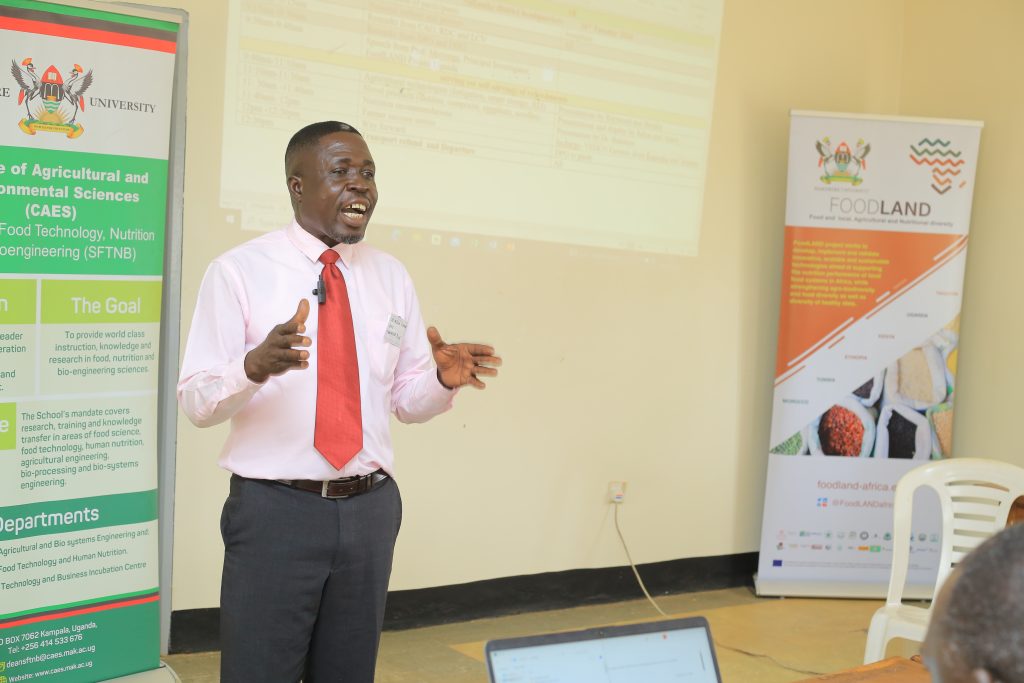
During the workshop, Mr. Barak Price, a student on the project sensitized participants on the rodent control system. He also trained the farmers on precision irrigation/fertigation. The farmers were also taken through the processes of value addition. Ms. Josephine Kisakye, a researcher on the project discussed the nutrition recommendations developed by the project. In the course of the project activities, it was noted that diets in Uganda are mainly composed of starchy staples, especially cereals, roots, tubers and bananas, with legumes constituting the main protein source. Intake of micronutrient-rich foods is low, despite various interventions to promote consumption of fruits, and vegetables. Ugandan adult and elderly population in both rural and urban areas were found to be at risk of under-nutrition and micro-nutrient deficiencies. Nutritional recommendations included: i) Daily consumption of locally available fruits and vegetables, whole starchy staples, and protein-rich foods; including beans, peas, nuts, fish, eggs, and meat; ii) Limiting the consumption of fried foods, salt, alcohol, and sweetened beverages; iii) Hydrate with fluids, preferably water; Regular engagement in moderate-intensity physical activity like brisk walking, digging, swimming, aerobics, and cycling; vi) Undertaking medical examination at intervals of no longer than 6 months to facilitate timely detection and treatment of ailments like diabetes, hypertension, high plasma cholesterol and cancers.
Appreciation by the District officials
Butalangu Town Clerk, Ms. Rashida Mutebi on behalf of the Chief Administrative Officer appreciated the project for reaching out and working with the local communities to improve their livelihoods. “The trainings on value addition will go a long way in saving our farmers losses,” she noted, calling for resilience and cooperation amongst the farmers. “It is important that you work together. Always share best practices if you are to improve yourselves and gain more from farming. I also implore you to always keep records of your farming activities.”
In his remarks, Nakaseke District Health Officer, Dr Alija Simon noted that the challenge of non-communicable diseases was on the raise due to poor feeding habits. He expressed gratitude to the project for incorporating the important aspect of nutrition in its research.
DPMO Wandera James appreciated the Government of Uganda for investing in farming. He also appreciated the project team for the trainings offered to the farmers in the district, noting that value addition was a key area of focus in the Parish Development Model. “Nakaseke is now becoming a food hub. I thank Makerere University for working with the communities. Initially, research was done but stopped in the shelves of the University. We are happy that you are now working with the communities to identify solutions to the challenges undermining agriculture. Research should be conducted for development.”
Addressing participants, the Assistant RDC, Nakaseke District, Mr. Muhoozi Michael appreciated Makerere University, specifically the FoodLAND Project, calling for more innervations to support farmers in the district out of poverty. He implored the farmer groups to form a cooperative, noting that the latter forms a better platform for soliciting support.
A similar dissemination exercise was conducted in Kamuli District in Eastern Uganda.
